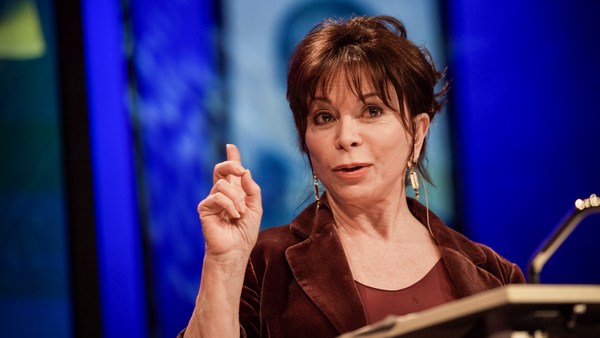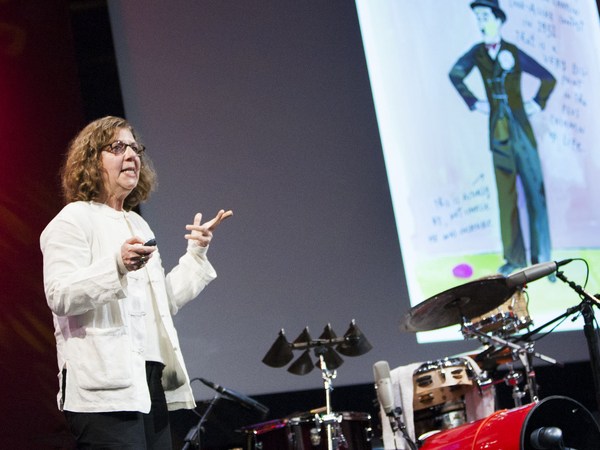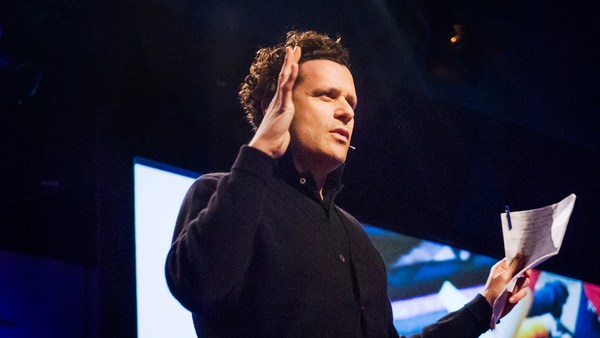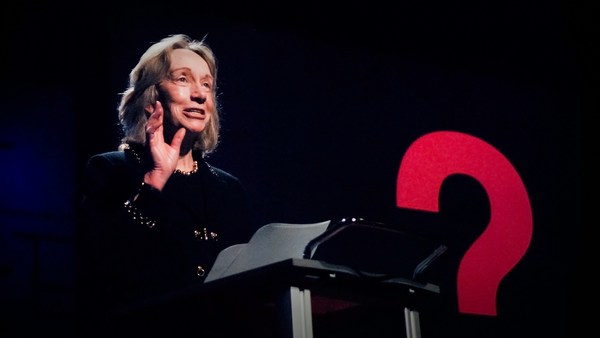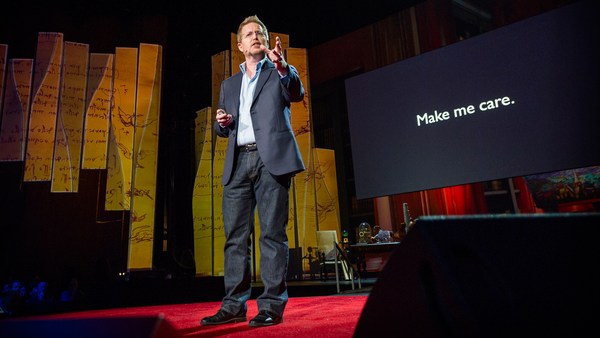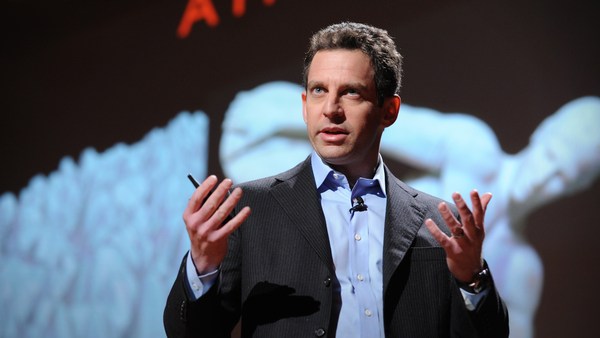The Value of Nothing: Out of Nothing Comes Something. That was an essay I wrote when I was 11 years old and I got a B+. (Laughter) What I'm going to talk about: nothing out of something, and how we create. And I'm gonna try and do that within the 18-minute time span that we were told to stay within, and to follow the TED commandments: that is, actually, something that creates a near-death experience, but near-death is good for creativity. (Laughter) OK.
So, I also want to explain, because Dave Eggers said he was going to heckle me if I said anything that was a lie, or not true to universal creativity. And I've done it this way for half the audience, who is scientific. When I say we, I don't mean you, necessarily; I mean me, and my right brain, my left brain and the one that's in between that is the censor and tells me what I'm saying is wrong. And I'm going do that also by looking at what I think is part of my creative process, which includes a number of things that happened, actually -- the nothing started even earlier than the moment in which I'm creating something new. And that includes nature, and nurture, and what I refer to as nightmares.
Now in the nature area, we look at whether or not we are innately equipped with something, perhaps in our brains, some abnormal chromosome that causes this muse-like effect. And some people would say that we're born with it in some other means. And others, like my mother, would say that I get my material from past lives. Some people would also say that creativity may be a function of some other neurological quirk -- van Gogh syndrome -- that you have a little bit of, you know, psychosis, or depression. I do have to say, somebody -- I read recently that van Gogh wasn't really necessarily psychotic, that he might have had temporal lobe seizures, and that might have caused his spurt of creativity, and I don't -- I suppose it does something in some part of your brain. And I will mention that I actually developed temporal lobe seizures a number of years ago, but it was during the time I was writing my last book, and some people say that book is quite different.
I think that part of it also begins with a sense of identity crisis: you know, who am I, why am I this particular person, why am I not black like everybody else? And sometimes you're equipped with skills, but they may not be the kind of skills that enable creativity. I used to draw. I thought I would be an artist. And I had a miniature poodle. And it wasn't bad, but it wasn't really creative. Because all I could really do was represent in a very one-on-one way. And I have a sense that I probably copied this from a book. And then, I also wasn't really shining in a certain area that I wanted to be, and you know, you look at those scores, and it wasn't bad, but it was not certainly predictive that I would one day make my living out of the artful arrangement of words.
Also, one of the principles of creativity is to have a little childhood trauma. And I had the usual kind that I think a lot of people had, and that is that, you know, I had expectations placed on me. That figure right there, by the way, figure right there was a toy given to me when I was but nine years old, and it was to help me become a doctor from a very early age. I have some ones that were long lasting: from the age of five to 15, this was supposed to be my side occupation, and it led to a sense of failure.
But actually, there was something quite real in my life that happened when I was about 14. And it was discovered that my brother, in 1967, and then my father, six months later, had brain tumors. And my mother believed that something had gone wrong, and she was gonna find out what it was, and she was gonna fix it. My father was a Baptist minister, and he believed in miracles, and that God's will would take care of that. But, of course, they ended up dying, six months apart. And after that, my mother believed that it was fate, or curses -- she went looking through all the reasons in the universe why this would have happened. Everything except randomness. She did not believe in randomness. There was a reason for everything. And one of the reasons, she thought, was that her mother, who had died when she was very young, was angry at her. And so, I had this notion of death all around me, because my mother also believed that I would be next, and she would be next. And when you are faced with the prospect of death very soon, you begin to think very much about everything. You become very creative, in a survival sense.
And this, then, led to my big questions. And they're the same ones that I have today. And they are: why do things happen, and how do things happen? And the one my mother asked: how do I make things happen? It's a wonderful way to look at these questions, when you write a story. Because, after all, in that framework, between page one and 300, you have to answer this question of why things happen, how things happen, in what order they happen. What are the influences? How do I, as the narrator, as the writer, also influence that? And it's also one that, I think, many of our scientists have been asking. It's a kind of cosmology, and I have to develop a cosmology of my own universe, as the creator of that universe.
And you see, there's a lot of back and forth in trying to make that happen, trying to figure it out -- years and years, oftentimes. So, when I look at creativity, I also think that it is this sense or this inability to repress, my looking at associations in practically anything in life. And I got a lot of them during what's been going on throughout this conference, almost everything that's been going on.
And so I'm going to use, as the metaphor, this association: quantum mechanics, which I really don't understand, but I'm still gonna use it as the process for explaining how it is the metaphor. So, in quantum mechanics, of course, you have dark energy and dark matter. And it's the same thing in looking at these questions of how things happen. There's a lot of unknown, and you often don't know what it is except by its absence. But when you make those associations, you want them to come together in a kind of synergy in the story, and what you're finding is what matters. The meaning. And that's what I look for in my work, a personal meaning.
There is also the uncertainty principle, which is part of quantum mechanics, as I understand it. (Laughter) And this happens constantly in the writing. And there's the terrible and dreaded observer effect, in which you're looking for something, and you know, things are happening simultaneously, and you're looking at it in a different way, and you're trying to really look for the about-ness, or what is this story about. And if you try too hard, then you will only write the about. You won't discover anything. And what you were supposed to find, what you hoped to find in some serendipitous way, is no longer there. Now, I don't want to ignore the other side of what happens in our universe, like many of our scientists have. And so, I am going to just throw in string theory here, and just say that creative people are multidimensional, and there are 11 levels, I think, of anxiety. (Laughter) And they all operate at the same time.
There is also a big question of ambiguity. And I would link that to something called the cosmological constant. And you don't know what is operating, but something is operating there. And ambiguity, to me, is very uncomfortable in my life, and I have it. Moral ambiguity. It is constantly there. And, just as an example, this is one that recently came to me. It was something I read in an editorial by a woman who was talking about the war in Iraq. And she said, "Save a man from drowning, you are responsible to him for life." A very famous Chinese saying, she said. And that means because we went into Iraq, we should stay there until things were solved. You know, maybe even 100 years. So, there was another one that I came across, and it's "saving fish from drowning." And it's what Buddhist fishermen say, because they're not supposed to kill anything. And they also have to make a living, and people need to be fed. So their way of rationalizing that is they are saving the fish from drowning, and unfortunately, in the process the fish die.
Now, what's encapsulated in both these drowning metaphors -- actually, one of them is my mother's interpretation, and it is a famous Chinese saying, because she said it to me: "save a man from drowning, you are responsible to him for life." And it was a warning -- don't get involved in other people's business, or you're going to get stuck. OK. I think if somebody really was drowning, she'd save them. But, both of these sayings -- saving a fish from drowning, or saving a man from drowning -- to me they had to do with intentions.
And all of us in life, when we see a situation, we have a response. And then we have intentions. There's an ambiguity of what that should be that we should do, and then we do something. And the results of that may not match what our intentions had been. Maybe things go wrong. And so, after that, what are our responsibilities? What are we supposed to do? Do we stay in for life, or do we do something else and justify and say, well, my intentions were good, and therefore I cannot be held responsible for all of it? That is the ambiguity in my life that really disturbed me, and led me to write a book called "Saving Fish From Drowning."
I saw examples of that. Once I identified this question, it was all over the place. I got these hints everywhere. And then, in a way, I knew that they had always been there. And then writing, that's what happens. I get these hints, these clues, and I realize that they've been obvious, and yet they have not been. And what I need, in effect, is a focus. And when I have the question, it is a focus. And all these things that seem to be flotsam and jetsam in life actually go through that question, and what happens is those particular things become relevant. And it seems like it's happening all the time. You think there's a sort of coincidence going on, a serendipity, in which you're getting all this help from the universe. And it may also be explained that now you have a focus. And you are noticing it more often.
But you apply this. You begin to look at things having to do with your tensions. Your brother, who's fallen in trouble, do you take care of him? Why or why not? It may be something that is perhaps more serious -- as I said, human rights in Burma. I was thinking that I shouldn't go because somebody said, if I did, it would show that I approved of the military regime there. And then, after a while, I had to ask myself, "Why do we take on knowledge, why do we take on assumptions that other people have given us?" And it was the same thing that I felt when I was growing up, and was hearing these rules of moral conduct from my father, who was a Baptist minister. So I decided that I would go to Burma for my own intentions, and still didn't know that if I went there, what the result of that would be, if I wrote a book -- and I just would have to face that later, when the time came.
We are all concerned with things that we see in the world that we are aware of. We come to this point and say, what do I as an individual do? Not all of us can go to Africa, or work at hospitals, so what do we do, if we have this moral response, this feeling? Also, I think one of the biggest things we are all looking at, and we talked about today, is genocide. This leads to this question. When I look at all these things that are morally ambiguous and uncomfortable, and I consider what my intentions should be, I realize it goes back to this identity question that I had when I was a child -- and why am I here, and what is the meaning of my life, and what is my place in the universe?
It seems so obvious, and yet it is not. We all hate moral ambiguity in some sense, and yet it is also absolutely necessary. In writing a story, it is the place where I begin. Sometimes I get help from the universe, it seems. My mother would say it was the ghost of my grandmother from the very first book, because it seemed I knew things I was not supposed to know. Instead of writing that the grandmother died accidentally, from an overdose of opium, while having too much of a good time, I actually put down in the story that the woman killed herself, and that actually was the way it happened. And my mother decided that that information must have come from my grandmother.
There are also things, quite uncanny, which bring me information that will help me in the writing of the book. In this case, I was writing a story that included some kind of detail, period of history, a certain location. And I needed to find something historically that would match that. And I took down this book, and I -- first page that I flipped it to was exactly the setting, and the time period, and the kind of character I needed -- was the Taiping rebellion, happening in the area near Guilin, outside of that, and a character who thought he was the son of God.
You wonder, are these things random chance? Well, what is random? What is chance? What is luck? What are things that you get from the universe that you can't really explain? And that goes into the story, too. These are the things I constantly think about from day to day. Especially when good things happen, and, in particular, when bad things happen. But I do think there's a kind of serendipity, and I do want to know what those elements are, so I can thank them, and also try to find them in my life. Because, again, I think that when I am aware of them, more of them happen.
Another chance encounter is when I went to a place -- I just was with some friends, and we drove randomly to a different place, and we ended up in this non-tourist location, a beautiful village, pristine. And we walked three valleys beyond, and the third valley, there was something quite mysterious and ominous, a discomfort I felt. And then I knew that had to be [the] setting of my book. And in writing one of the scenes, it happened in that third valley. For some reason I wrote about cairns -- stacks of rocks -- that a man was building. And I didn't know exactly why I had it, but it was so vivid. I got stuck, and a friend, when she asked if I would go for a walk with her dogs, that I said, sure. And about 45 minutes later, walking along the beach, I came across this. And it was a man, a Chinese man, and he was stacking these things, not with glue, not with anything. And I asked him, "How is it possible to do this?" And he said, "Well, I guess with everything in life, there's a place of balance." And this was exactly the meaning of my story at that point. I had so many examples -- I have so many instances like this, when I'm writing a story, and I cannot explain it. Is it because I had the filter that I have such a strong coincidence in writing about these things? Or is it a kind of serendipity that we cannot explain, like the cosmological constant?
A big thing that I also think about is accidents. And as I said, my mother did not believe in randomness. What is the nature of accidents? And how are we going to assign what the responsibility and the causes are, outside of a court of law? I was able to see that in a firsthand way, when I went to beautiful Dong village, in Guizhou, the poorest province of China. And I saw this beautiful place. I knew I wanted to come back. And I had a chance to do that, when National Geographic asked me if I wanted to write anything about China. And I said yes, about this village of singing people, singing minority. And they agreed, and between the time I saw this place and the next time I went, there was a terrible accident. A man, an old man, fell asleep, and his quilt dropped in a pan of fire that kept him warm. 60 homes were destroyed, and 40 were damaged. Responsibility was assigned to the family. The man's sons were banished to live three kilometers away, in a cowshed. And, of course, as Westerners, we say, "Well, it was an accident. That's not fair. It's the son, not the father."
When I go on a story, I have to let go of those kinds of beliefs. It takes a while, but I have to let go of them and just go there, and be there. And so I was there on three occasions, different seasons. And I began to sense something different about the history, and what had happened before, and the nature of life in a very poor village, and what you find as your joys, and your rituals, your traditions, your links with other families. And I saw how this had a kind of justice, in its responsibility. I was able to find out also about the ceremony that they were using, a ceremony they hadn't used in about 29 years. And it was to send some men -- a Feng Shui master sent men down to the underworld on ghost horses. Now you, as Westerners, and I, as Westerners, would say well, that's superstition. But after being there for a while, and seeing the amazing things that happened, you begin to wonder whose beliefs are those that are in operation in the world, determining how things happen.
So I remained with them, and the more I wrote that story, the more I got into those beliefs, and I think that's important for me -- to take on the beliefs, because that is where the story is real, and that is where I'm gonna find the answers to how I feel about certain questions that I have in life. Years go by, of course, and the writing, it doesn't happen instantly, as I'm trying to convey it to you here at TED. The book comes and it goes. When it arrives, it is no longer my book. It is in the hands of readers, and they interpret it differently. But I go back to this question of, how do I create something out of nothing? And how do I create my own life?
And I think it is by questioning, and saying to myself that there are no absolute truths. I believe in specifics, the specifics of story, and the past, the specifics of that past, and what is happening in the story at that point. I also believe that in thinking about things -- my thinking about luck, and fate, and coincidences and accidents, God's will, and the synchrony of mysterious forces -- I will come to some notion of what that is, how we create. I have to think of my role. Where I am in the universe, and did somebody intend for me to be that way, or is it just something I came up with? And I also can find that by imagining fully, and becoming what is imagined -- and yet is in that real world, the fictional world. And that is how I find particles of truth, not the absolute truth, or the whole truth. And they have to be in all possibilities, including those I never considered before.
So, there are never complete answers. Or rather, if there is an answer, it is to remind myself that there is uncertainty in everything, and that is good, because then I will discover something new. And if there is a partial answer, a more complete answer from me, it is to simply imagine. And to imagine is to put myself in that story, until there was only -- there is a transparency between me and the story that I am creating.
And that's how I've discovered that if I feel what is in the story -- in one story -- then I come the closest, I think, to knowing what compassion is, to feeling that compassion. Because for everything, in that question of how things happen, it has to do with the feeling. I have to become the story in order to understand a lot of that. We've come to the end of the talk, and I will reveal what is in the bag, and it is the muse, and it is the things that transform in our lives, that are wonderful and stay with us. There she is. Thank you very much! (Applause)
